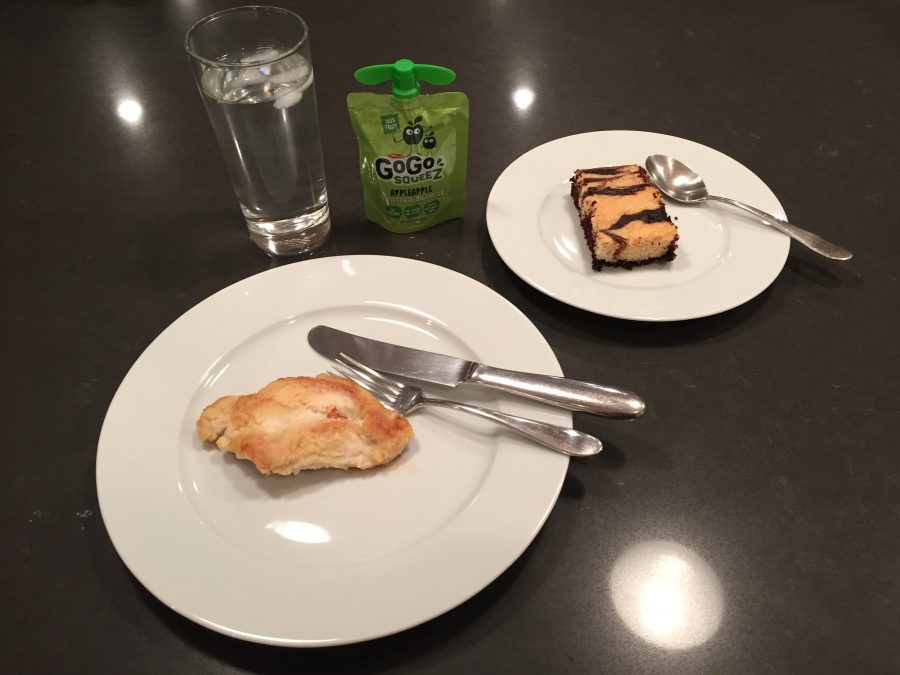Sticking it to the breadstick
Photo Credit: Chloe Siohan
A basic gluten free meal.
October 15, 2016
People who don’t have a gluten allergy could compare the symptoms to having a terrible stomach ache.
Caitlin O’Brien, a ninth grader who has a passion for theatre says, “I definitely miss non-gluten free foods, but I think the hardest aspect is planning.”
O’Brien has Celiac Disease and has lived in Glen Rock for a little bit over a year now.
A gluten allergy is something that impacts many people everyday, especially in Glen Rock. If we can work together by educating ourselves and others, parents will be less worried about their children.
“I’ve always had stomach problems,” she said. “With Celiac, it can be triggered by stressful moments and it started showing up when I first moved here, and during the beginning of the school year.”
Celiac Disease is a hereditary disease, in which nutrients cannot be properly absorbed into the body. This is due to a damaged small intestine, caused by gluten. The only remedy for this disease is a gluten-free diet.
“It was definitely harder to find good brands that taste good. I mean, there is a lot of gluten-free foods, but a lot of them don’t taste very good,” O’Brien said. “You have to sort-through to find things that taste good and are a good price.”
O’Brien struggles with school trips, such as the one to Washington, D.C. when she was an eighth grader.
“The teachers were really understanding my problems, but specific restaurants, one time they served me a plate with a breadstick on it, which contains gluten,” she explained.
Although this breadstick doesn’t seem like a big deal, it is in her case. Since she has such a sensitivity to gluten, just having the breadstick (which contains gluten) would trigger her celiac.
O’Brien feels that teachers were understanding towards her during the D.C. trip, and that the school handles allergies well.
“During the pool party last year, they served gluten free pizza,” she said.
Another account of allergies comes from a student in the sixth grade, whose severe allergies include dairy, gluten, all types of nuts, and eggs.
This student has missed out on opportunities due to allergies.
“In science sometimes they do labs that requires you to drop an egg,” they say, which is a problem due to their egg allergy.
Another person affected by allergies comes from Amanda Willoughby, a mother in town whose children have allergies.
The “allergy mom” stereotype is a negative stereotype for a mother with children who have allergies, and one that depicts a person who micromanages to protect her child; for example, if a mother wanted a school to get rid of class parties due to allergies.
“Food allergies are very scary, and people react differently and have different strategies for managing it,” she said in regard to the “allergy mom” stereotype.
Willoughby explained how distressing it can be for parents who have children with allergies, and asks people to not be so quick to judge parents of children with severe allergies.
She says, “It’s sad to me that people would judge others and their ways of trying to manage something difficult and scary,” she says. “We choose to manage it a certain way and other people manage it in a way that works for them.”
As a mother of children in Glen Rock schools, she thinks the schools handle allergies fairly well.
“I think the school district is trying their best to create a safe and inclusive environment, and trying to manage and help people with all the different perspectives on how to manage it and how to organize things,” she said.
Willoughby and her family take precautions when going out, to prevent her child from getting an allergic reaction.
“When we go out we take all of our child’s food and meds with us,” she said. “We bring all of the food or make arrangements to have all the facilities we need when we get there.”
For people with allergies, the proximity to a hospital is an important part of keeping themselves safe in case anything should go wrong.
“We also make sure that we are always within 30 minutes of a hospital, in case there is an accident. When you are out, sometimes that’s when more accidents can happen,” she said. We make sure that we have medicine, his food, and that we have access to a healthcare facility.”
Willoughby said that the hardest part about managing her child’s allergies is trying new foods.
“At the end of the day, I just try to remember how scary it is for parents and children,” she said.




